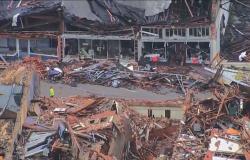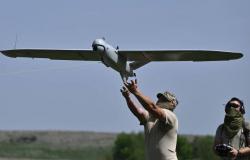Since the start of the war in Sudan, almost a year ago, at least 108 villages have been burned there. This is reported by researchers from the British human rights organization Center for Information Resilience (CIR), which investigates human rights violations and war crimes in Sudan, Afghanistan, Myanmar and Ukraine.
Based on freely accessible images on social media, satellite images, media reports and NASA data on temperature fluctuations, ‘Sudan Witness’, part of CIR, investigated how often and where villages were set on fire. Most of the fires were started in the Darfur region and later spread to Kordofan.
Fighting militias in Sudan, including the paramilitary Rapid Support Forces (RSF), are increasingly using fires as a weapon of war, according to the CIR. In February alone, twenty villages were set on fire; the highest number since April last year. The war has killed 10,000 to 15,000 people since last year, according to United Nations estimates. At least eight million people have been displaced.
The conclusion about the total number of fires and destroyed villages is based on fires that are almost certain to have been deliberately started. The researchers have tried as closely as possible to identify and rule out ‘accidental’ fires – for example those caused by shelling or heat – but emphasize that ultimately there remains a margin of error and the conclusions are not completely definitive.
Militia members with jerry cans
The CIR investigation shows that some villages have been burned more than once, camps for displaced persons have been set on fire causing people to flee again, and villages close to each other have been set on fire in the same period. Many social media images examined by CIR, and also viewed by NRCshow militia members with jerry cans, with houses in flames and streets littered with bodies in the background.
Also read
One of the worst wars of extermination ever seen in Africa is raging in Sudan
“In towns like Misterei, near the border with Chad, where tens of thousands of people live, we have seen fires in recent months with entire parts of the city going up in flames just days apart,” said Anouk Theunissen of Sudan Witness. “This destruction has forced many to leave their homes and those left behind are living in fear.” Previously, human rights organization Human Rights Watch reported at least 28 summary executions in the same city.
On April 15, 2023, war broke out in the Sudanese capital Khartoum. Rivals Abdel Fattah al-Burhan of the state army and Mohamed Hamdan Dagalo, alias Hemedti, of the paramilitary RSF – two factions of the Sudanese armed forces – went to war after years of tensions.
At the same time, an old conflict flared up in the western region of Darfur, between Sudanese of Arab and African descent. Multiple reports of gang rape, looting and ethnic cleansing have been reported in Khartoum and towns in Darfur captured by the RSF. Much of the ethnic violence is attributed to militias that are part of – or affiliated with – the RSF.
Also read
this explanation from Africa correspondent Koert Lindijer about the war in Sudan
‘Acute hunger’
Since the war, the humanitarian situation in Sudan has been very worrying. Earlier this month, the UN warned that a third of Sudan’s population, around 18 million people, is facing ‘acute hunger’. Aid organization Save the Children warns that two hundred and twenty thousand children and more than seven thousand pregnant and newly-delivered women “will likely die in the coming months from malnutrition.” That forecast is based on current financing of Sudan’s emergency food program, which currently covers only 5.5 percent of the African country’s needs.
It has become almost impossible for humanitarian organizations to reach people in Sudan, partly due to the ongoing fighting but also because humanitarian aid would be stopped at the border. Volker Türk, UN human rights chief, previously called this a possible war crime.
Aid supplies have been looted and humanitarian workers attacked, while international organizations and non-governmental organizations have complained about bureaucratic obstacles to entering the military-controlled center of Port Sudan and getting humanitarian aid into the country.
In a speech earlier this month, Türk called the crisis in Sudan “a tragedy that seems to have disappeared into the mist of global amnesia.” He called on the international community to return attention to the country. “Sudan has become a living nightmare.”
To share
Email the editor







